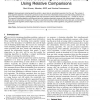Free Online Productivity Tools
i2Speak
i2Symbol
i2OCR
iTex2Img
iWeb2Print
iWeb2Shot
i2Type
iPdf2Split
iPdf2Merge
i2Bopomofo
i2Arabic
i2Style
i2Image
i2PDF
iLatex2Rtf
Sci2ools
TKDE
2008
2008
Semisupervised Clustering with Metric Learning using Relative Comparisons
Semisupervised clustering algorithms partition a given data set using limited supervision from the user. The success of these algorithms depends on the type of supervision and also on the kind of dissimilarity measure used while creating partitions of the space. This paper proposes a clustering algorithm that uses supervision in terms of relative comparisons, viz., x is closer to y than to z. The proposed clustering algorithm simultaneously learns the underlying dissimilarity measure while finding compact clusters in the given data set using relative comparisons. Through our experimental studies on high-dimensional textual data sets, we demonstrate that the proposed algorithm achieves higher accuracy and is more robust than similar algorithms using pairwise constraints for supervision.
Related Content
| Added | 15 Dec 2010 |
| Updated | 15 Dec 2010 |
| Type | Journal |
| Year | 2008 |
| Where | TKDE |
| Authors | Nimit Kumar, Krishna Kummamuru |
Comments (0)

